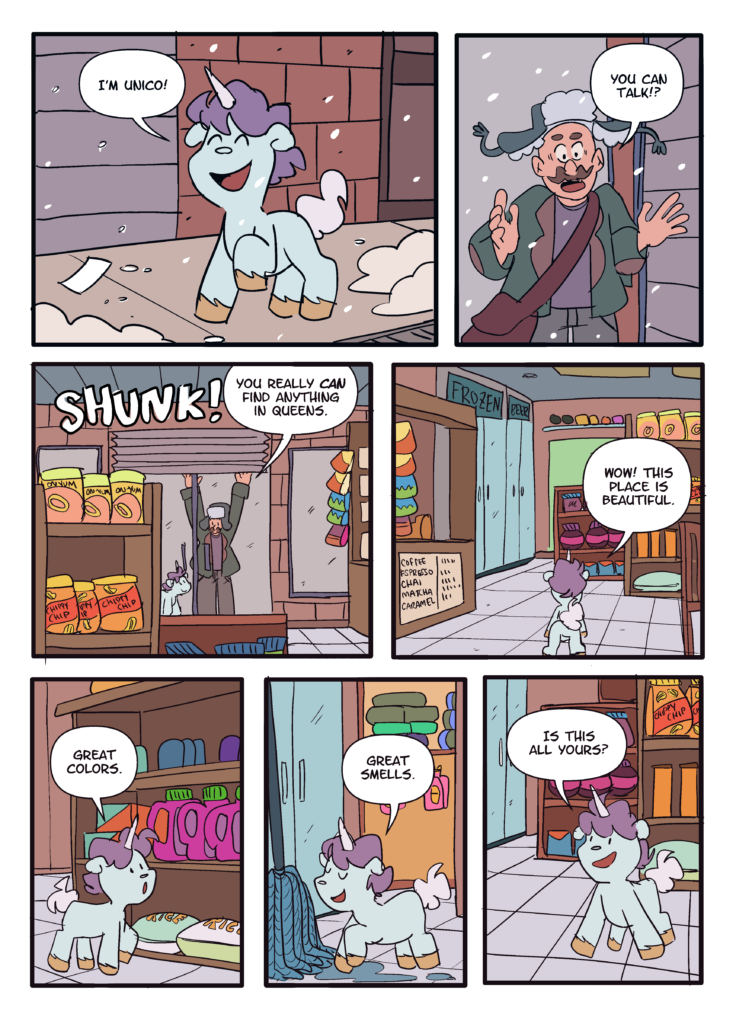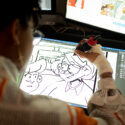Steenz does it all.
They’re an artist, a cartoonist, an editor, a professor, a writer, a mentor and, above all, an iconic figure in the cartooning community. Steenz, a St. Louis based cartoonist who uses they/them pronouns, never thought that they would be where they are today. In fact, the odds were stacked against them.
After all, mainstream editorial cartooning is saturated with white cis-men – by a wide margin.
“Most of the cartoonists have been working in the industry for 30 to 40 years, you know,” Steenz said. “It’s a very lucrative and stable job.”
With few opportunities for new and diverse voices in the industry, it’s only when established cartoonists retire or a deliberate effort is made to make space that newcomers get a chance to break through. Luckily for Steenz, space opened up at the perfect time for them.
In April 2020, Mark Tatulli, cartoonist of the iconic comic strip “Heart of the City,” passed the torch to Steenz.
“I grew up reading syndicated comics,” Steenz said. “Everyone grew up reading syndicated comics. When I was approached to audition for the strip, I had no idea what followed. I knew I liked comics. I didn’t know if I could do it. But I decided to give it a try.”
Needless to say, the path there was nothing short of revolutionary.

The Origin Story
Like most twentysomethings, Steenz didn’t know what they wanted to do. But they loved art, creating and had the skills to succeed. Their childhood was filled with supportive parents who wanted them to really cultivate their passion for art – through art classes and summer school.
But when it came to a career, there was a limit to how much their parents knew about succeeding in the art industry. The same could be said for Steenz.
College didn’t necessarily answer that question. Steenz went on to attend college at Maryville University, but struggled to find what they wanted to pursue. Graphic design? Hated it. Interior design? Same issue. They stuck with studio art, a temporary fix to the problem.
At the end of the day, Steenz was still coming up against a wall.
So they dropped out. It wasn’t until they landed a job at the local mom-and-pop comic store that their skills came to life. There, Steenz hosted events like ladies night and comic shows and programming that pulled a good-sized crowd into the comic book store. Drawing on the side, Steenz’s passion for art grew.

“I always was an artist at heart,” Steenz said. “So whether I was drawing illustrations or little slice-of-life comics, I was always doing something to make my hobby come alive.”
When Steenz saw a comic by Brittany Williams, a black storyboard and comic book artist, the game changed. As a Black, non-binary artist wanting to step into an industry dominated by white cisgender men, Steenz never thought they would find someone who looked like them doing what they were so passionate about doing.
“You know, it makes sense as I say it, but when you’re in your early 20s, and you’re in an industry that is widely white cis-male, it never comes as an opportunity for you to be like, ‘Oh, maybe I can do that,’” Steenz said. “And so I started doing comics with friends. Did I make any money off of it? No. But I got my name in a book, and I found that my work was really worthwhile.”
From that day forward, making comics became Steenz’s thing. When Steenz left the bookstore to work at a library, Ivy Noelle Weird entered the picture. The two teamed up to create a graphic novel titled Archival Quality.
When Oni Press, an American independent comic book and graphic novel publisher, opened up submissions for the first time, the two thought, “Why not?”
So they pitched it. Out of 800 different pitches, only eight stories were chosen to move forward and be published. Archival Quality was one of the eight.
“It was really terrifying,” Steenz said. “We had never made a graphic novel before. So our background in comics was very much self-published and self-taught. It was a ‘We do it because we love it’ situation. We didn’t know anything. We didn’t have an agent. We didn’t have a manager. We were just like, ‘Yeah, let’s do it,’ and it turned out to be really successful.”
So successful that it won the 2018 Dwayne McDuffie Award for diversity. This deal jump-started their career. Steenz began to step out on their own to create their own comics. Flash forward to a few years later, “Heart of the City” came into the picture.
“It felt wild,” Steenz said. “I’m so used to having my work be criticized for the art. So it was really interesting that when I moved into syndicated comics, they didn’t even mention that but instead told me to focus on the storytelling. It was a new thing for me to step into.”
Steenz is grateful for the people in their life who have seen them in all seasons. Whether it was the people who taught Steenz to make an eight-page zine, or the librarians who taught them how to use the Xerox machine or how to research, everyone they’ve interacted with has helped them reach where they are today.
Giving the wisdom back
The road to success wasn’t always easy. Steenz had to make hard decisions to keep a roof over their head. They worked at Victoria’s Secret, Hallmark, Delia’s and their college bookstore, all of which didn’t pay much. But it kept them off the street and fed, with a few dollars in their pocket, enough to buy some art supplies to lean into their passion.
Steenz didn’t graduate college. They struggled financially. But today, they have several books and strips all published under their name. Steenz wants to share their story with others.
That anyone can be a cartoonist of an award-nominated syndicated strip. That anyone can be a creator of a graphic novel. That anyone can be an asset to building community in the comics industry.
“Everyone knows the starving artist trope. And they may not have the funds to go to an art school or anything like that. But it can be done. It can be done with your neighbors, it can be done with your friends and with your community.”
Steenz’s passion for cartooning and desire to inspire others led them to teach a cartooning class at Webster University. By sharing their knowledge and expertise, Steenz hopes to spark an interest in students who may feel that cartooning is beyond their abilities. They firmly believe that with enough practice and dedication to a craft, anyone can unlock their creative potential.
“I have always been someone who is pro-education, anti-school,” Steenz said. “In my heart, I need to teach. Everything that I do, I do with the idea that someone’s going to look at it and think ‘I can do this in the future because I’m learning from watching someone else.’ I just wouldn’t have gotten anywhere and in my life without it if I didn’t have people who were willing to teach me.”
Steenz has one goal for the future. To keep doing what they’re doing. Writing, drawing, leading, attending comic cons and just creating. Steenz even has a graphic novel on the way called Side Quest that dives into the history of Tabletop Roleplaying Games.
But more than anything, Steenz wants to be a resource for anyone needing a push to follow their passion.
“Don’t wait for opportunities to come to you. Start making those opportunities for yourself,” Steenz said. “They may be shitty, they may not be some of the best work that you have felt about it, but it’s complete. And I think completion is more important than perfection.”

